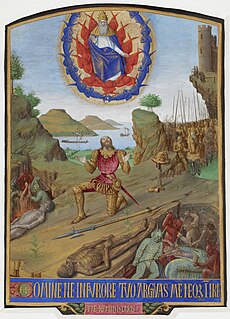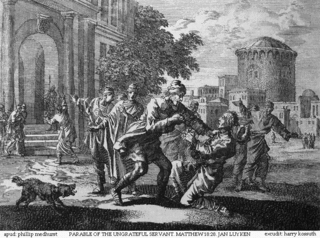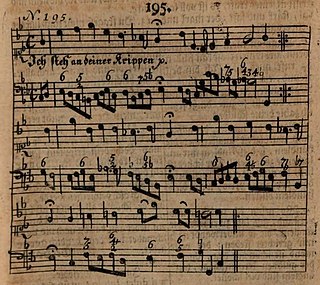Related Research Articles
The Bach-Werke-Verzeichnis is a catalogue of compositions by Johann Sebastian Bach. It was first published in 1950, edited by Wolfgang Schmieder. The catalogue's second edition appeared in 1990. An abbreviated version of that second edition, known as BWV2a, was published in 1998.
Chorale fantasia is a type of large composition based on a chorale melody, both works for organ, and vocal settings, for example the opening movements of Bach's chorale cantatas, with the chorale melody as a cantus firmus.
Johann Ernst Bach was a German composer of the Bach family. He was the son of Johann Bernhard Bach.

Psalm 6 is the 6th psalm from the Book of Psalms. The Psalm gives its author as King David. David's supposed intention in writing the psalm was that it would be for anyone suffering from sickness or distress or for the state of the Kingdom of Israel while suffering through oppression.
The 66 Chorale improvisations for organ, Op. 65, were composed by Sigfrid Karg-Elert between 1906 and 1908, and first published in six volumes in 1909. The composition was dedicated to "the great organist Alexandre Guilmant".
There are 52 chorale cantatas by Johann Sebastian Bach surviving in at least one complete version. Around 40 of these were composed during his second year as Thomaskantor in Leipzig, which started after Trinity Sunday 4 June 1724, and form the backbone of his chorale cantata cycle. The eldest known cantata by Bach, an early version of Christ lag in Todes Banden, BWV 4, presumably written in 1707, was a chorale cantata. The last chorale cantata he wrote in his second year in Leipzig was Wie schön leuchtet der Morgenstern, BWV 1, first performed on Palm Sunday, 25 March 1725. In the ten years after that he wrote at least a dozen further chorale cantatas and other cantatas that were added to his chorale cantata cycle.

Johann Sebastian Bach composed the church cantata Mache dich, mein Geist, bereit, BWV 115, in Leipzig for the 22nd Sunday after Trinity and first performed it on 5 November 1724. The chorale cantata is based on the hymn by Johann Burchard Freystein (1695).

"Nun freut euch, lieben Christen g'mein" is a Lutheran hymn, written in 1523 by Martin Luther. One of his early hymns, it was published as one of eight songs in 1524 in the first Lutheran hymnal, the Achtliederbuch, which contained four songs by Luther, three by Speratus, and one by Justus Jonas. It appeared also in 1524 in the Erfurt Enchiridion.
"Warum sollt ich mich denn grämen" is a Lutheran hymn with a text by Paul Gerhardt written in 1653. It was first published that same year in the fifth edition of Johann Crüger's hymnal Praxis Pietatis Melica, set to a melody composed by Crüger. In the 1993 Protestant hymnal, Evangelisches Gesangbuch, it appears as number 370 with a melody composed by Johann Georg Ebeling, which was published with the divergent title "Warum sollt ich mich doch grämen" in Pauli Gerhardi Geistliche Andachten in 1666.
"Herzlich tut mich verlangen" is a German hymn, with lyrics written in 1599 by Christoph Knoll, with a melody adapted from a secular song by Hans Leo Hassler. It is a prayer for a blessed death, beginning "Herzlich tut mich verlangen nach einem sel'gen End". Its hymn tune, Zahn No. 5385a, was later also used for Paul Gerhardt's "Befiehl du deine Wege" and "O Haupt voll Blut und Wunden".

52 chorale preludes, Op. 67, is a collection of 52 settings of popular Protestant hymns for organ by Max Reger, composed between 1900 and 1902. Originally published in three volumes between 1900 and 1903 with the cover title "52 Choralvorspiele für Orgel", the full title of the collection was "Zweiundfünfzig leicht ausführbare Vorspiele zu den gebräuchlichsten evangelischen Chorälen".

"Schmücke dich, o liebe Seele" is a Lutheran hymn in German, with lyrics by Johann Franck and a hymn tune by Johann Crüger. It was first published in Crüger's 1649 Geistliche Kirchen-Melodien, and was later adopted in other hymnals, such as the 1653 edition of his Praxis pietatis melica.

"Was mein Gott will, das g'scheh allzeit" is a Lutheran hymn in German. The text from c. 1550 is attributed to Albert, Duke of Prussia. The melody, Zahn No. 7568, goes back to a tune by Claudin de Sermisy, written in 1529 for a secular French song. The hymn has belonged to core Lutheran hymnody without interruption and is part of the Protestant hymnal Evangelisches Gesangbuch as EG 364.

"Ich steh an deiner Krippen hier" is a German Christmas hymn, with lyrics by Paul Gerhardt which were first published in 1653. It was then sung with an older melody by Martin Luther, but a melody which was likely created by Johann Sebastian Bach for Schemellis Gesangbuch of 1736 is now part of current Protestant and Catholic hymnals.
References
- ↑ "Straf mich nicht in deinem Zorn". christliche-gedichte.de. Retrieved 16 August 2016.
- ↑ "Straf mich nicht in deinem Zorn". hymnary.org. Retrieved 16 August 2016.
- ↑ "Not in anger, Mighty God". hymnary.org. Retrieved 16 August 2016.
- 1 2 3 4 "Chorale Melodies used in Bach's Vocal Works / Straf mich nicht in deinem Zorn". Bach-Cantatas. 2006. Retrieved 16 August 2016.
- ↑ "Straf mich nicht in deinem Zorn". colmarisches.free.fr. Retrieved 22 August 2016.